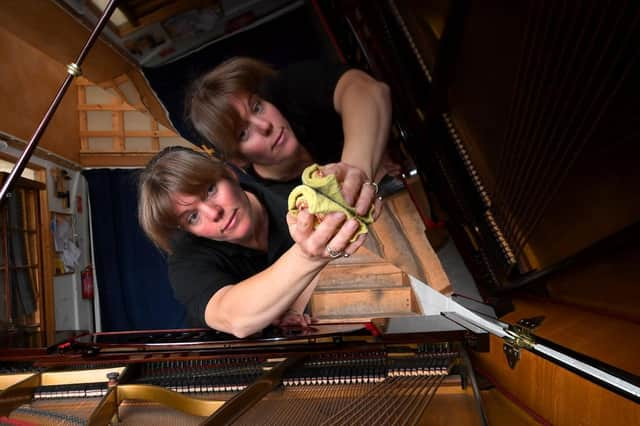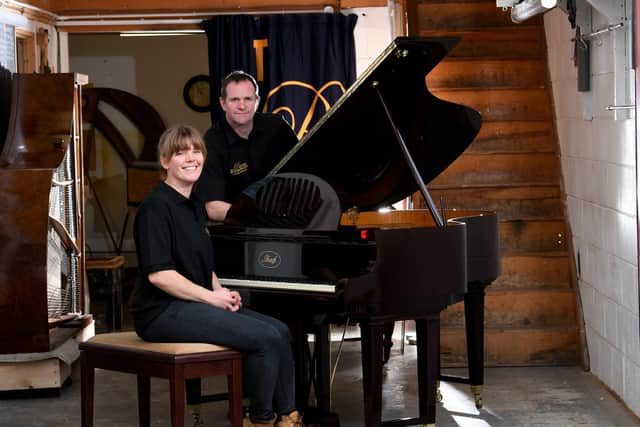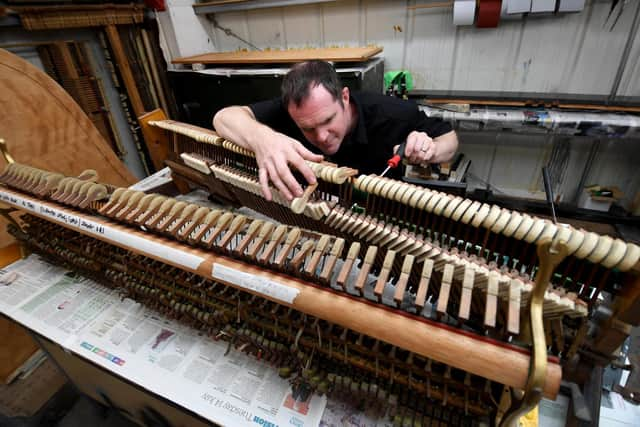The Kirkbymoorside piano tuner and restorer with stories of Elton John and Andrew Lloyd-Webber


Piano tuner and restorer Aidan Simms is incredibly modest when describing his career path, yet he was one of only two people to successfully complete a highly specialised diploma course when he graduated in 1999. It’s only when he mentions being asked to tune a piano for Elton John to play and describes the nerve-wracking experience of having an assistant to Lord Andrew Lloyd-Webber play a prank on him that the true extent of his expertise becomes apparent.
Aidan, who lives in Kirkbymoorside, recalls how Lloyd-Webber’s assistant deliberately made him wait to hear the composer’s verdict on a tuning job that he had done for him, saying: “It was an Austrian Bösendorfer concert grand piano so I’d tuned it in an Austrian concert pitch, which is higher than the usual concert pitch of 440. When I told his assistant what I’d done, she said she would have to call him and check it was okay.
Advertisement
Hide AdAdvertisement
Hide Ad"So she telephoned him and there was this long silence. Eventually, I heard her say ‘oh dear’ and I was worried because, if he wasn’t happy with what I’d done, I’d only have 15 minutes to retune it. The manager of the venue was looking daggers at me as we waited for the response. Finally, the assistant came off the phone and said, very casually: “His football team lost, but 442 is fine.’”


“After school, I was doing bits and bobs from an antique restorer. I’d got an old piano free of charge and wanted to be able to play it, so I decided to have a crack at rebuilding it and got some books from the library to help me,” he says.
“A retired teacher in Whitby said he’d come and have a look at it for me. He told me I’d done a great job and asked me if I realised that I could do that sort of thing at college.”
It was this conversation that set Aidan on his chosen career path and he applied for a place at what is now Newark Piano School, the UK’s centre of excellence for piano tuning, restoration and repair, where he was part of an intake of just ten students.


Advertisement
Hide AdAdvertisement
Hide Ad“They wanted you to have a basic understanding of music and also craft or woodworking skills, both of which I had, but also good hearing,” he says.
Out of the ten students who started the course, only five sat the final exam and just two passed it, largely because not everyone has the auditory skills required. “You have to have your hearing checked, so you sit with a tutor and a tone generator listening to a series of tones. You have to say what you can or can’t hear. It can be quite a lonely occupation because you don’t really have any benchmark. I think I got lucky with my hearing,” says Aidan.
“The course combined everything from the physics of sound to craft, design and technology. I loved it, but no one really cared about the certificates. It was the Newark name that was revered across the industry as all our teachers were highly respected people from the trade at a time when there were still a dozen reputable English piano manufacturers.”
After graduating, Aidan was head-hunted by the renowned piano company Steinway & Sons but, going against the advice of those around him, he became self-employed instead. “I had an urge to set up my own business, but it was a leap of faith. After a long talk with Steinway, they made me their representative for the North York Moors area, but I’ve had zero referrals from them over the years. I think people just pick up the phone book and look for their local piano tuner, so the business came to me that way instead.”
Advertisement
Hide AdAdvertisement
Hide AdAged just 23 and living in Whitby at the time, Aidan put an advertisement in the local newspaper, which initially generated one tuning job per fortnight on average, each of which earned him just £30. To supplement his income, he bought a couple of old pianos for £12 each at a saleroom, restoring and selling them on for a profit.
A £1,000 grant from the Prince’s Trust gave his fledgling business a boost by enabling him to buy and insure a car, but initially, for three days each week, he worked for a kitchen-making business that let him store pianos in the back room and use the firm’s tools to work on them.
From these humble origins, Aidan’s business grew and he eventually expanded across the entire ground floor of the Whitby premises. He went on to open a second workshop in Knaresborough, but found that he was constantly driving between the two sites.
This prompted Aidan to relocate the Piano Workshop, as the business is now known, to its current base in Pickering so that he could serve clients across North Yorkshire.
Advertisement
Hide AdAdvertisement
Hide AdTwenty years on, Aidan’s customer base now stretches even further and he has been joined by a second piano tuner, Simon Topping, who also graduated from Newark College, and finishing expert Kate Bentley, who Aidan trained himself. Kate is responsible for restoring piano cabinets back to showroom standard, using either traditional French polishing techniques or spray lacquering for a more contemporary look.
The team care for pianos at a number of Yorkshire theatres and concert halls, which has resulted in them tuning in preparation for performances by Jools Holland, Lesley Garrett and other high-profile names.
“We have to liaise with the production teams so that everything is in place for the artist to be able to just walk up five minutes before they perform,” says Aidan.
Each year, the team completely rebuilds around ten pianos, which involves stripping them back. “They’re usually with us for six months and we get very attached to them. We rescued the nine-foot Steinway from the Futurist Theatre in Scarborough after it closed, which took two years to rebuild, but it had had a roof collapse on it and had been damaged by a burst pipe.”
Advertisement
Hide AdAdvertisement
Hide AdWith some tuners now using an app as a visual aid, Aidan is clearly proud of the fact that he still relies on his impressive auditory abilities, and that his team continues to employ traditional skills and techniques.
In fact, he’s so passionate about pianos that he’s even named his young son after the famous piano maker Julius Blüthner and has high hopes of him joining the family business some day.
www.thepianoworkshop.co.uk/home
